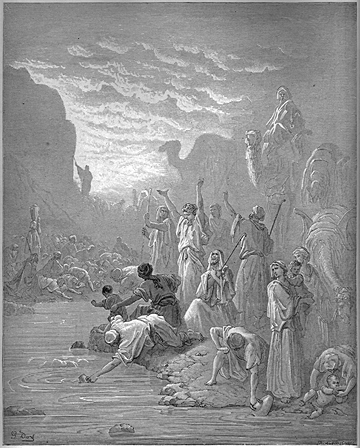Exodus 17
1 Gbogbo ìjọ ènìyàn Israẹli si gbéra láti jáde kúrò láti aginjù Sini wọ́n ń lọ láti ibi kan de ibi kan gẹ́gẹ́ bí Olúwa ti pàṣẹ. Wọ́n pàgọ́ sí Refidimu, ṣùgbọ́n kò sí omi fún àwọn ènìyàn láti mú.
Then all the Israelites left the Desert of Sin, going from place to place as they followed the Lord's commands. They camped at Rephidim, but there wasn't any water for the people to drink.
2 Àwọn ènìyàn sì sọ̀ fún Mose, wọ́n wí pé, “Fún wa ni omi mu.” Mose dá wọn lóhùn wí pé, “Èéṣe ti ẹ̀yin fi ń bá mi jà? Èéṣe ti ẹ̀yin fi ń dán Olúwa wò?”
Some of them came and complained to Moses, saying, “Give us water to drink!” Moses replied, “Why are you complaining to me?” Moses asked. “Why are you trying to challenge the Lord?”
3 Ṣùgbọ́n òǹgbẹ ń gbẹ àwọn ènìyàn, wọ́n sì ń kùn sí Mose, wọ́n wí pé, “Èéṣe tí ìwọ fi mú wa jáde kúrò ní Ejibiti láti mú kí òǹgbẹ pa àwa, àwọn ọmọ wa àti ohun ọ̀sìn wa ku fún òǹgbẹ.”
But the people were so thirsty for water there that they went on complaining to Moses, saying, “Why did you have to bring us out of Egypt? Are you trying to kill us and our children and livestock by thirst?”
4 Nígbà náà ni Mose gbé ohùn rẹ̀ sókè sí Olúwa pé, “Kí ni kí èmi kí ó ṣe fún àwọn ènìyàn yìí? Wọ́n múra tan láti sọ mi ni òkúta.”
Moses cried out to the Lord, “What am I going to do with these people? A bit more of this and they're going to stone me!”
5 Olúwa sì dá Mose lóhùn pé, “Máa lọ síwájú àwọn ènìyàn, mú nínú àwọn àgbàgbà Israẹli pẹ̀lú rẹ, mú ọ̀pá tí ìwọ fi lu odò Naili lọ́wọ́ kí ó sì máa lọ.
The Lord told Moses, “Go ahead of the people, and take some of the elders of Israel with you. Take with you the walking stick you used to hit the Nile, and just go on ahead.
6 Èmi yóò dúró ni ibẹ̀ dè ọ ni orí àpáta ni Horebu. Ìwọ ó sì lu àpáta, omi yóò sì jáde nínú rẹ̀ fún àwọn ènìyàn láti mu.” Mose sì ṣe bẹ́ẹ̀ ni iwájú àwọn àgbàgbà Israẹli.
Look, I will stand there beside you by the rock at Horeb. When you hit the rock water will pour out for the people to drink.” So Moses did this as the elders of Israel watched.
7 Ó sì sọ orúkọ ibẹ̀ ni Massa àti Meriba, nítorí àwọn ọmọ Israẹli sọ̀, wọ́n sì dán Olúwa wò, wọ́n wí pé, “Ǹjẹ́ Olúwa ń bẹ láàrín wa tàbí kò sí?”
He called the place Massah and Meribah because the Israelites argued there, and because they challenged the Lord, saying, “Is the Lord with us, or not?”
8 Àwọn ara Amaleki jáde, wọ́n sì dìde ogun sí àwọn ọmọ Israẹli ni Refidimu.
Then some Amalekites came and attacked the Israelites at Rephidim.
9 Mose sì sọ fún Joṣua pé, “Yàn lára àwọn ọkùnrin fún wa, kí wọn ó sì jáde lọ bá àwọn ará Amaleki jà. Ní ọ̀la, èmi yóò dúró ni orí òkè pẹ̀lú ọ̀pá Ọlọ́run ní ọwọ́ mi.”
Moses told Joshua, “Choose some of men and go out and fight the Amalekites. Tomorrow I'll stand on the top of this hill holding the walking stick of God.”
10 Joṣua ṣe bí Mose ti wí fún un, ó sì bá àwọn ará Amaleki jagun; nígbà tí Mose, Aaroni àti Huri lọ sí orí òkè náà.
Joshua did what Moses told him and fought the Amalekites, while Moses, Aaron, and Hur climbed to the top of the hill.
11 Níwọ́n ìgbà tí Mose bá gbé apá rẹ̀ sókè, Israẹli n borí ṣùgbọ́n nígbà tí ó bá sì rẹ apá rẹ̀ sílẹ̀, Amaleki a sì borí.
As long as Moses held up the walking stick his hands, the Israelites were the ones winning, but when he lowered them, it was the Amalekites.
12 Ṣùgbọ́n apá ń ro Mose, wọ́n mú òkúta, wọ́n sì fi sí abẹ́ rẹ̀, ó sì jókòó lé òkúta náà; Aaroni àti Huri sì mu ní apá rẹ̀, ọ̀kan ní apá ọ̀tún àti èkejì ni apá òsì; apá rẹ̀ méjèèjì sì dúró gangan títí di ìgbà ti oòrùn wọ.
So when Moses' hands became heavy, the others took a stone and put it under him for him to sit on. Aaron and Hur stood on each side of Moses and held his hands up. In this way his hands were kept firmly up until the sun went down.
13 Joṣua sì fi ojú idà ṣẹ́gun àwọn ará Amaleki.
As a result Joshua defeated the Amalekite army.
14 Olúwa sì sọ fun Mose pé. “Kọ èyí sì inú ìwé fún ìrántí, kí o sì sọ fún Joṣua pẹ̀lú; nítorí èmi yóò pa ìrántí Amaleki run pátápátá kúrò lábẹ́ ọ̀run.”
The Lord told Moses, “Write all this down on a scroll as a reminder and read it out loud to Joshua, because I'm going to completely wipe out the Amalekites so nobody on earth will remember them.”
15 Mose sì tẹ́ pẹpẹ kan, ó sì sọ orúkọ pẹpẹ náà ní Olúwa ni Àsíá mi.
Moses built an altar and called it “the Lord is my banner of victory.”
16 Ó wí pé, “A gbé ọwọ́ sókè sí ìtẹ́ Olúwa. Olúwa yóò bá Amaleki jagun láti ìran dé ìran.”
“Hold up the victory banner of the Lord!” Moses declared. “The Lord will go on fighting the Amalekites for all generations!”





















